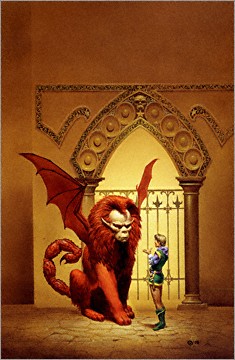 Piers Anthony is still alive. He wrote a lot of the fantasy and SF that I loved when I was coming up in the 1980s. These were breezy books, easy to read, lots of great characters and situations and tons of ideas. It was a fantasy of ideas. The Apprentice Adept series, the Incarnations of Immortality, and Xanth.
Piers Anthony is still alive. He wrote a lot of the fantasy and SF that I loved when I was coming up in the 1980s. These were breezy books, easy to read, lots of great characters and situations and tons of ideas. It was a fantasy of ideas. The Apprentice Adept series, the Incarnations of Immortality, and Xanth.
In the first Xanth novel, a Manticore asks the great wizard a question. “Do I have a soul?” The Manicore fears that, as a monster, he does not. The Wizard explains that only those who have a soul, wonder if they have a soul. It is, to me, a much more satisfying fairy tale ending than Dorothy having “always had the power” to get home.
Games can be fun for a lot of reasons. They can be rewarding, for different reasons. But I think they can also have soul. Humanity. I’m beginning to think the difference between traditional storytelling media and games is that the older media are revelatory while this new one we’re creating is expressive.
In other words, in a good movie–and I think film is the best at this–you can have an experience that sheds light on what it means to be a human being. You can learn something you didn’t know about being a person. You can see something you did know, expressed in a way that reinforces it, that validates it, that makes you think “YES! That’s how it is!” And which makes the experience of being a person more real.
Wereas in games we have the opportunity to express that humanity. To do things that capture the essential nature, the beauty, of being alive, of being human.
Some games, in other words, have soul. They are soul, they’re about it. They are spiritually nourishing.
Minecraft
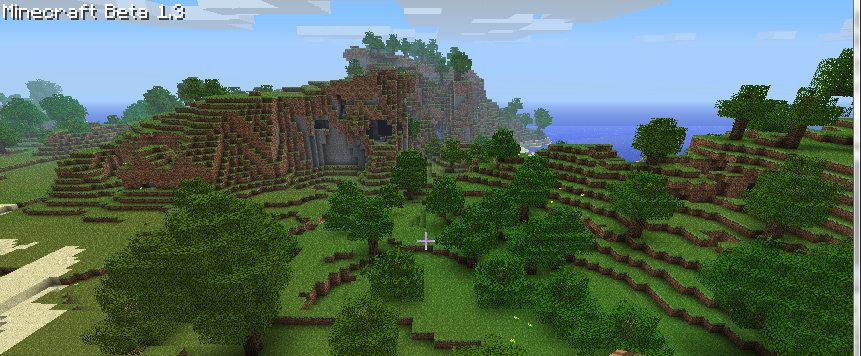
When I started playing Minecraft a few weeks ago, I think I formed the wrong opinion about it. I was enjoying myself, but we can enjoy ourselves for a lot of reasons not all of which are fun. I had the distinct sensation, as I whiled away the hours, that I was wasting time. “This,” I thought, “is what Jonathon Blow is talking about.” I was playing Minecraft instead of doing something real. Instead of working on the sequel to my book.
But I think that’s a mistake. I wasn’t doing any of the things Blow talks about as soul-destroying. I wasn’t chasing after achievements, I wasn’t grinding levels…or grinding anything. I wasn’t humiliating other players. I wasn’t competing with anyone over anything. I was exploring and building. I was imagining things…and then making them. Working to make them, solving the problems of making them and then loving the result.
I made that initial mistake because Minecraft is ephemeral and I mistook that as being bad. It’s not. That these things we make, this world we explore isn’t real, isn’t real and can go away if the server is nuked, doesn’t make it less relevant to our experience as people, it makes it more relevant. Building sandcastles is not a waste of time. That life is ephemeral is what gives it value. It doesn’t matter how terrible or marvelous your experience is, how awful or wonderful today is for you…this too shall pass.
Minecraft isn’t just a game with soul, it’s nothing but soul. Its literally singular vision–one dude wrote the whole thing–is nothing except the wonder of exploration, and giving you the tools to be an artist, make what you want. Whatever you’re inspired to do. Because of this, because the game concentrates on these elements and nothing else, it is a joy to play. I mean that in the same sense St. Thomas Aquinas meant it. An expansion of the heart. You can easily lose yourself for hours planning, mining, building, exploring, experimenting. And on a multi-player server, you know, or hope, or imagine, that other players will find the things you make. And marvel at them. How wonderful is that? That your desire is to make something amazing, and then show it to people. How different from what our culture thinks of when it thinks of “video game.”
Minecraft looks like the kind of game you’d get if the dude who made Adventure for the Atari 2600 in 1979 had a 3D engine. It looks extremely primitive. And it’s sold something like 3 million units at $20 a pop. Think about what it means that a game that looks so bad, by modern standards, done by a single dude, has sold to many millions of people.
What are people responding except the soul evident in the game? People are hungry for it, and when it is put in front of them, they flock to it.
Osmos
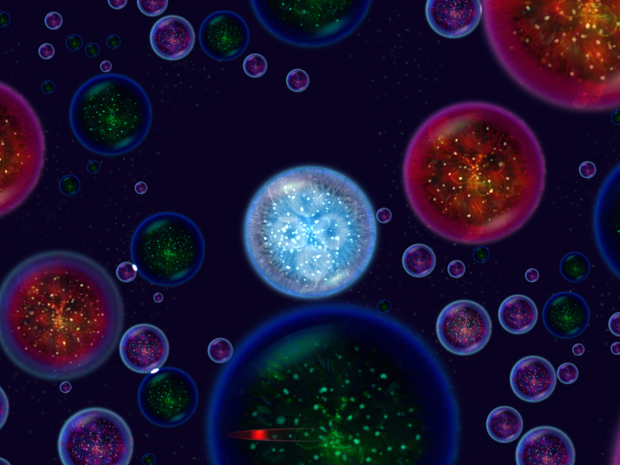
Osmos is a brilliant little game for the iPad that is fundamentally beautiful. Beautiful in presentation, the music is beautiful, the gameplay is beautiful. Beautiful the way physics can be beautiful. Before anyone knew the structure of DNA, James Watson knew what it was not. He, rightly, rejected paths that led to inelegant, ugly, but workable solutions to the problem. “The truth is beautiful,” he said. He wasn’t the first. That was my experience playing Osmos. It’s a unique intersection, a marriage between gameplay, controls, and presentation. That marriage isn’t just clever, or well-designed, it was beautiful.
The music in Osmos is beautiful. You can control the flow of time in the game, speed it up and slow it down, and the music changes accordingly. Remaining engrossing, atmospheric, lush at any speed. You never have the experience of thinking “Oh this is the speed it was meant to be listened at.” Quite a feat.
The result is not merely a game that’s fun to play, it’s fun to watch. I lay in bed before sleep sometimes for fifteen minutes just watching the little motes spin in orbits, thinking, hoping, believing, that they would collide in advantageous ways. I do not consider that time wasted. It was spiritually nourishing. It was a meditation.
Portal, but not Portal 2
The triumph of Portal was a triumph of soul, I feel. There was a love of humanity, a quirky, poignant statement made in the relationship between you and GLaDOS. We felt it as we played, and we missed it in Portal 2. I don’t think you can do Portal, and then More Portal Again, without losing some of the soul of the first game. The act of saying “let’s just do more of this” seems a kind of intellectual decision, rather than a spiritual one.
There was a joy evident in Portal. Joy in playing the game, in experimenting, in not only solving the puzzles, but joy in trying to solve them, that I think was missing from the second game.
GLaDOS had a soulful humanity about her. I think that’s one of the big things people responded to. Jonathon Coulton’s song at the end fit so well, was so perfect, because it captured that humanity. The game’s soul. I do not feel I am being redundant when I repeat these things, I feel I am being emphatic.
Legend of Grimrock
You’ve probably never heard of this one, it’s not out yet, but I challenge you to watch that video and not understand what I’m talking about. A small team of industry vets decide to go it alone, and make the game they love. Their love for the game, nary a marketing or management decision in sight, is evident in everything you see. It looks gorgeous. It takes modern graphics and does something essentially primitive with them. It’s an old-school dungeon crawler from back when you were locked to a grid. You couldn’t even look around freely. You had to turn 90 degrees to see what was on your left and right.
I think that game’s going to be a hit. I don’t think it matters if you played any of those games in the 1980s or 1990s, I think the fact that these guys love it and have the skill and talent required to express that love in their production will mean we love it.
Love, humanity, spirit, soul. These are words I’m using a lot. If you need them defined…you’re missing the point. If you need a list, you can’t have one. These are human issues, as Aristotle said. There are not mathematical solutions.
If you want everything I’m talking about boiled down to its essence, here it is…
Sword & Sworcery
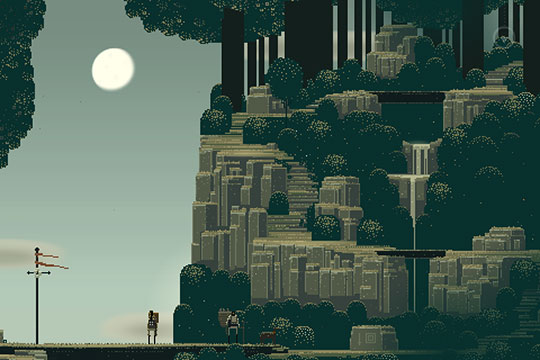
Sword & Sworcery is nothing but soul. Like Minecraft, the art is primitive…but beautiful. Like the paintings at Lascaux, they’re primitive only in the technology used to create them. But they are perfectly human, expressive, beautiful, artful, in what that technology expresses.
Just walking around in S&S is neat. Watching the animations, the way characters and trees and sunlight and lakes are represented. There is very little of what might be termed gameplay, and what gameplay there is feels…it’s not very satisfying. I was always eager to get back to the game when I was away from it, but not because I looked forward to swinging my sword or blocking with my shield.
One noted criticism when the game showed at an early convention was “It’s nothing but walking around!!” The designers, as described in the post-mortem, scratched their heads. Either they were on the wrong track, or the reviewer was missing the point.
They were not on the wrong track.
As there is soul, there is its opposite, I feel. There are games which are an attack on our humanity. Our experience of being human.
Anti-human
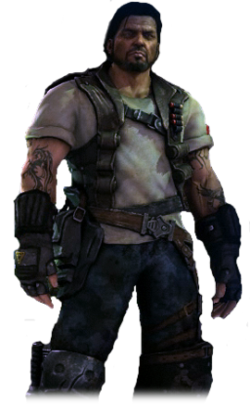 This is not a man. He doesn’t look like a man, he doesn’t talk like one. He looks like a funhouse mirror image of a man. Misshapen, out of proportion. When we see people in the real world who look like this, we freak out, we make fun of them. It’s not just his image that’s out of proportion, it’s his language, his actions. In fact, when we normally see him, he’s locked in a suit that’s literally impossible. There’s no place for his body in the suit, his head is microscopic, a tiny blip at the top of a tower of metal. Everything deliberately exaggerated to draw attention to his fundamental inhumanity.
This is not a man. He doesn’t look like a man, he doesn’t talk like one. He looks like a funhouse mirror image of a man. Misshapen, out of proportion. When we see people in the real world who look like this, we freak out, we make fun of them. It’s not just his image that’s out of proportion, it’s his language, his actions. In fact, when we normally see him, he’s locked in a suit that’s literally impossible. There’s no place for his body in the suit, his head is microscopic, a tiny blip at the top of a tower of metal. Everything deliberately exaggerated to draw attention to his fundamental inhumanity.
Games in general, and not just games, superhero comics, but Blizzard games in particular, often come under fire for being anti-female. All the women in their games are strippers. But this, I feel, misses an essential point. The men in this game are also awful. Awful to look at, awful to inhabit. It’s a 13-year old’s aspirations, and not a very emotionally healthy 13 year old. It’s the folks who saw Heavy Metal when they were kids, and spend the rest of their lives thinking “this is normal for men and women.” The women, the men, the fantasies, are all awful statements.
There isn’t anyone in these games that looks an acts like a person. These strippers and roided-out muscle-men, the fantasies they present, feel to me now like attacks on humanity. On our capacity to be human. Our capacity to feel, to care. about other people. Ourselves. Blizzard’s games have a phenomenal amount of polish, and often excellent gameplay. But they are fundamentally anti-human. The people they present, the people they imagine, are, look, behave awful. Not badly drawn, but cruelly imagined.
I loved playing Starcraft 2, I spent hundreds of hours in the multiplayer. The folks who worked on that should be incredibly proud. It’s the single-player game that I found repulsive. I thought it was very badly designed, a colossal amount of time spent learning new units and game mechanics and even different perspectives which are never used, after you’ve learned them. No time spent playing with them, leveraging what you’ve learned. But that’s not the point I’m making here.
Fantasy & Taste
The fantasy of saving the world, of defending the Earth against aliens, is awesome. There’s nothing wrong with that. It doesn’t say anything about the nature of the experience within to say you run around shooting aliens. What you like, saving the Earth, airstrikes, rolling things into a ball, playing a plastic guitar, these are just down to taste. Your taste and mine do not align perfectly. So mote it be.
But within that spectrum of taste–you like Fantasy games, he likes modern warfare games, she likes space-fighter sims, whatever–within that spectrum are games that have soul, and games that are soulless. It takes some time spent inside the games with soul to realize that what you were doing before was toxic. Cancerous. You have have thought you liked that game…but you really didn’t. You didn’t know any better. This is what Mark Kermode is talking about in his book. When you lived in a slum, in poverty, you thought a water heater that only worked one day out of three was awesome, because before you had no hot water heater at all. But once you left the slum, you realized all the stuff you thought was awesome before was actually pretty shit. It was an awful way to live, but you didn’t have any other perspective.
DIY
It’s no coincidence that so many games with soul are–or started as–Indie games. We live in a new age. It’s not coming, it’s here. You and your friends can make a game. UDK, iOS SDK, Unity, LOVE, you can do it yourself. And the result is…people do. They use games and the medium of games to express themselves. That we now have so many games with soul should not be a surprise, it should be expected. This is what happens when small groups of people make the game they love. When they take joy in the creation of the game. The joy is expressed in the final product.
It’s because of this new revolution, because of the time spent in games like Minecraft and Osmos and Sword & Sworcery that we can look back on the games we’ve been playing for 15 years and say “Hang on, that’s crap.” It might have good gameplay, but it’s a toxic experience. It’s not just that we can do better…we ARE doing better! Those games are out there. Many more I’ve never even played. Some that are to your taste. Yes, yours. Your specific taste, you who think all the games I’ve mentioned sound crap. Don’t put up with the image of humanity sold to you in AAA games featuring men who started juicing in the womb and women who, even when naked and covered in chitinous armor, spontaneously evolve stiletto heels.
Art
It doesn’t matter to me if video games are art or not. Matters not one whit, wouldn’t bother me to discover they are not, or even cannot be, could never be. Because to me, Art is that which reminds us of what it means to be human. Art expands our understanding of our own humanity.
Whereas what I see in games like Minecraft and Sword & Sworcery is an expression of that humanity, not a confirmation of it. An experience of it. Joy.
Might not be art, but I like it.

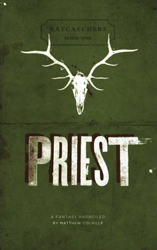 My first novel
My first novel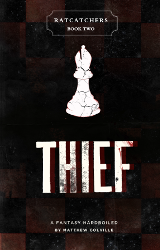 My new novel.
My new novel.